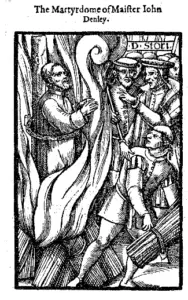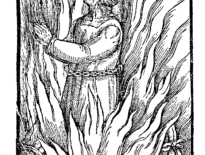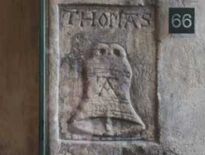 This week's #MondayMartyr is John Denley, who was burnt at the stake in Uxbridge for his Protestant faith on 8th August 1555, in the reign of Queen Mary I.
This week's #MondayMartyr is John Denley, who was burnt at the stake in Uxbridge for his Protestant faith on 8th August 1555, in the reign of Queen Mary I.
Protestant poet Thomas Brice recorded Denley's execution in his 1559 work "A Compendious Regester"*, writing:
"When Denly died at Uxbridge towne,
With constant care to Christe’s cause;"
Martyrologist John Foxe states that Denley was from Maidstone in Kent and that when he was travelling in Essex with his friend, John Newman, in June 1555 to visit "their godly friends" in the county, both men were apprehended by Edmund Tyrrel, a justice of the peace, who searched them and found "the confessions of their faith in writing about them".
Tyrrel sent them to the queen's commissioners, explaining what he'd found and saying that Denley and Newman had "confessed to me that they had forsaken and fled out of their country for religion's sake". As for the "confessions of their faith", these included "The difference of doctrine between the faithful and the papists concerning the sacrament is, that the papists say, that Christ is corporally under or in the forms of bread and wine; but the faithful say, that Christ is not there, neither corporally nor spiritually; but in them that worthily eat and drink the bread and wine, he is spiritually, but not corporally" and that the "papists" who believed that Christ's body and blood were contained in the bread and wine "do commit idolatry and make abominable idols of them".
Foxe explains that Denley and Newman were sent before Edmund Bonner, Bishop of London, who examined them and another man, Patrick Packingham, "upon their confessions" on 28th June. You can read their answers to the "articles" Bonner examined them on in Foxe's "Book of Martyrs" at https://www.exclassics.com/foxe/foxe304.htm, but Denley confirmed that he believed that:
- The present church in England was "the church of the antichrist, the bishop of Rome being the head thereof" and that the church had "altered the testament of God" and was "full of blasphemy and lies".
- The mass was "naught" and "abominable idolatry and blasphemy against God's holy word".
- "Auricular confession is not good, as it is now used".
- The sacrament of baptism has been altered and changed, and that "St. John Baptist used nothing but the preaching of the word and the water, as it doth appear, when Christ required to be baptized of him... We do not read that he asked for any cream, nor oil, not for spittle, nor conjured water, nor conjured wax, nor yet crysom, nor salt...".
- There are only two sacraments: baptism and the blood and body of Christ.
On 1st July 1555, the three men were taken before the consistory court at St Paul's to be tried as heretics. On 5th July, they were condemned as heretics and given over to the secular authorities, the sheriffs of London.
On 8th August 1555, John Denley was burnt at the stake at Uxbridge in Middlesex. John Foxe records:
"And being set in the fire with the burning flame about him, he sung in it a psalm. Then cruel Dr. Story, being there present, commanded one of the tormentors to hurl a fa*got at him, whereupon, being hurt therewith upon the face that he bled again, he left his singing, and clapt both his hands on his face. "Truly," quoth Dr. Story to him that hurled the fa*got, "thou hast marred a good old song."
The said John Denley, being yet still in the flame of the fire, put his hands abroad, and sung again, yielding at the last his spirit into the hands of God, through his Son Jesus Christ.
On 28th August 1555, Patrick Packingham was burnt at Uxbridge, and John Newman was burnt at Saffron Walden, Essex, on 31st August 1555.
Image: A woodcut of the martyrdom of Master John Denley, John Foxe's "Actes and Monuments".
Notes and Sources
*The full title is "A Compendious Register in Metre conteinyng the names and pacient suffrynges of the membres of Jesus Christ, afflicted, tormented, and cruelly burned here in Englande since the death of our late famous kyng of immortall memorie Edwarde the sixte, to the entrance and beginnyngn of the reigne of our soveraigne and derest Lady Elizabeth of England, France, and Ireland, quene defender of the Faithe, to whose highnes truly and properly apperteineth, next and immediately vnder God, the supreme power and authoritie of the Churches of Englande and Ireland. So be it. Anno 1559."
- Thomas Brice's "A Compendious Register", https://www.bartleby.com/lit-hub/select-poetry-of-the-reign-of-queen-elizabeth/xiii-thomas-bryce/
- "JOHN DENLEY, GENTLEMAN, JOHN NEWMAN, AND PATRICK PACKINGHAM", chapter in John Foxe's "Book of Martyrs" - The Ex-Classics Website, https://www.exclassics.com/foxe/foxe304.htm



Leave a Reply